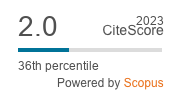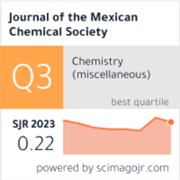One-Pot Synthesis of 1,8-Dioxodecahydroacridines and Polyhydroquinoline using 1,3-Di (bromo or chloro)-5,5-Dimethylhydantoin as a Novel and Green Catalyst under Solvent-Free Conditions
DOI:
https://doi.org/10.29356/jmcs.v57i4.192Keywords:
Aldehydes, cyclic 1, 3-dicarbonyl compounds, ammonium acetate, ethyl acetoacetate, green catalyst, solvent-free conditions, onepot synthesisAbstract
Solvent-free, one-pot synthesis of polyhdroquinoline and 1,8-dioxodecahydroacridine derivatives have been described via Hantzsch condensation of various aldehydes, ammonium acetate with (i) cyclic 1,3-dicarbonyl compounds and ethyl acetoacetate and (ii) cyclic 1,3-dicarbonyl compounds (2 mmoles) in a very simple, efficient, and environmentally benign method using 1,3-(dibromo or dichloro)-5,5-dimethylhydantoin as a cheap, non-toxic and neutral catalyst with up to excellent yields.Downloads
Downloads
Published
Issue
Section
License
Authors who publish with this journal agree to the following terms:
- Authors retain copyright and grant the journal right of first publication with the work simultaneously licensed under a Creative Commons Attribution License that allows others to share the work with an acknowledgement of the work's authorship and initial publication in this journal.
- Authors are able to enter into separate, additional contractual arrangements for the non-exclusive distribution of the journal's published version of the work (e.g., post it to an institutional repository or publish it in a book), with an acknowledgement of its initial publication in this journal.









